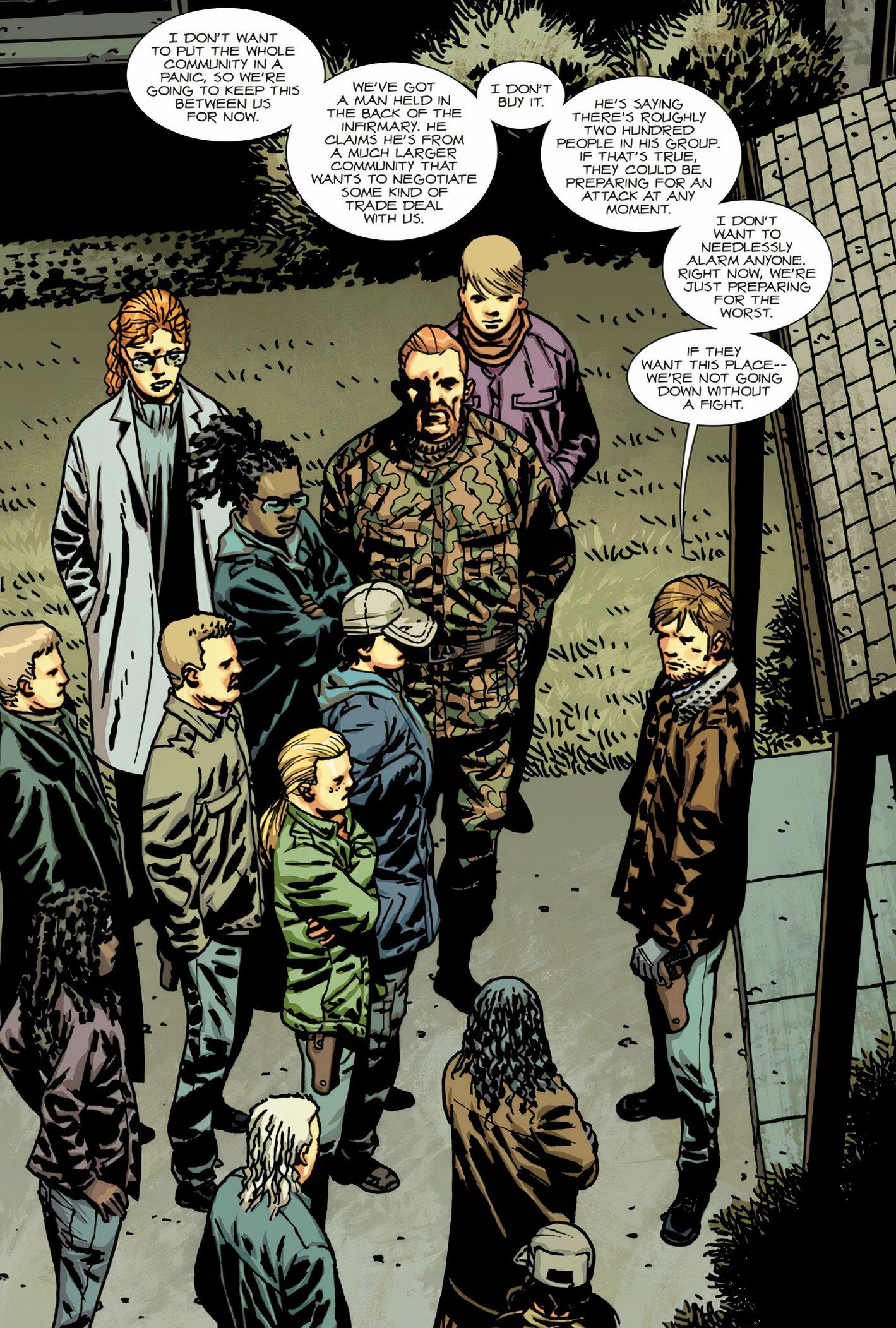Summary
- Walking Dead c reator Robert Kirkman admits to being frustrated with his over-use of expository dialogue in his legendary zombie comic series.
- According to Robert Kirkman, there was definitely a more dynamic, exciting way to script static scenes with lots of dialogue – something he admonished himself for not " putting in the work " to figure out while writing the comic.
- Kirkman's ongoing critique of his own work in The Walking Dead Deluxe has been a gift to fans of the franchise, especially those aspiring creators who seek to learn from the author's successes – and his failures.

According to series creator Robert Kirkman, there is one aspect of The Walking Dead comic series that he finds frustrating – to the point where he admonished himself not to make the same mistake while writing future stories. Looking back on the groundbreaking zombie comic in retrospect, Kirkman admitted that he finds the series' reliance on expository dialogue to be "tedious" at times.
The Walking Dead Deluxe #93 – written by Robert Kirkman, with art by Charlie Adlard – contains the latest batch of annotations from the author, exploring the behind-the-scenes process of the series' creation. Frequently throughout this return to The Walking Dead, Kirkman has been critical of his own work, with his active dislike of the dialogue in this issue being another stand-out example.
These insights into the creation of the long-running comic have been the most exciting aspect of the Deluxe rerelease of the series, which also offers a full-color reprint of the original black-and-white art.
Robert Kirkman Explains The One Major Change He Would Make To The Walking Dead
The Walking Dead Deluxe #93 – Written By Robert Kirkman; Art By Charlie Adlard; Color By Dave McCaig; Lettering By Rus Wooten

As Kirkman explained, rather than taking issue with the dialogue itself, his problem is with the static scripting of the dialogue scene as a whole.
In his notes on The Walking Dead, Robert Kirkman has not pulled any punches – while he has defended his work from criticism at times, he has also not shied away from emphasizing what he would do differently now, as a mature artist. With his comments published in The Walking Dead Deluxe #93, Kirkman seems especially impatient with his own use of exposition, which dominates a chunk of the issue. The author wrote:
...we get a tedious page of Rick giving characters specific direction. Is it okay to admit I don't care for these pages? They're...tedious, as I said. I don't think they're very effective. There's probably a more creative, more visual way to get all that information across. The next time I'm finding myself writing a page like this, I hope I put the work in to think of those different options.
As Kirkman explained, rather than taking issue with the dialogue itself, his problem is with the static scripting of the dialogue scene as a whole.
Though the example in The Walking Dead #93 that sparked this criticism may be particularly egregious, Kirkman's complaint seems to stem from the accrual of his dissatisfaction with this repeated "tedious" style of set-up throughout the series. He stated plainly:
I'm a little embarrassed how often I wrote pages like this in the series.
While revisiting The Walking Dead has been largely positive for Kirkman, comments like this make it clear that he has also been subjected to the occasional cringe at his past creative self. For fans of Robert Kirkman's work, it will be worth keeping track of in future stories, to see if he took this self-taught lesson to heart.
Robert Kirkman's Critique Of The Walking Dead Is A Gift To Future Writers
They Can Learn From His Mistakes

Even Robert Kirkman's harshest criticisms of his own writing in The Walking Dead have some crucial creative value.
Robert Kirkman's analysis of his "tedious" use of exposition reflects a longstanding observation about the structure of The Walking Dead. Throughout the series, Kirkman often devoted nearly entire issues to setup, while others delivered emphatic payoffs that largely justified the month-to-month pacing of the series. Exposition-heavy issues like The Walking Dead Deluxe #93 play an important role in the overall schematic of the series – though according to the author, there could have been, and should have been, a more dynamic way to depict these moments.
Ultimately, Robert Kirkman takes this blame on himself, alleviating his artistic collaborator Charlie Adlard of any responsibility for these "tedious" parts of The Walking Dead. Kirkman wrote:
Poor Charlie having to draw all those heads just listening as Rick told people to "find toilet paper and stack it up in two-foot-tall stacks." Sheesh.
Though at this point Kirkman can do little more than cite his chief concerns with The Walking Dead, it is likely he will be pleased if any aspiring author is able to learn from his mistakes, and avoid too much static delivery of expositional dialogue in their work. In that way, even Robert Kirkman's harshest criticisms of his own writing in The Walking Dead have some crucial creative value.



